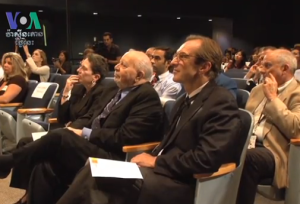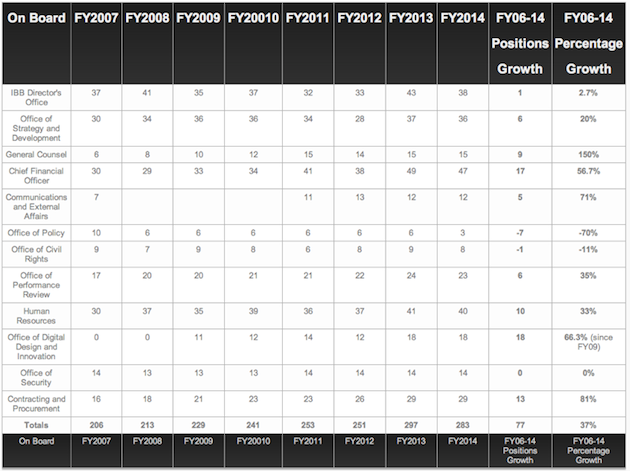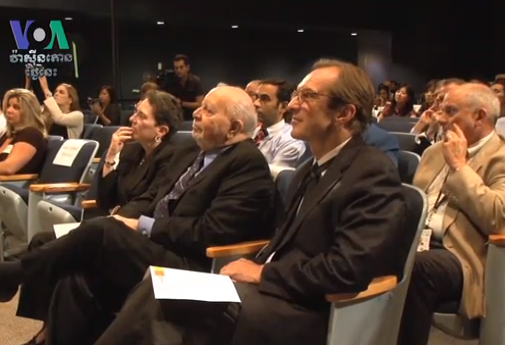BBG Watch Commentary
This commentary contains elements of satire and sarcasm. If you object to such content, please read no further. However, we are dead serious about the idea of doing a charity drive to raise at least $1.6 million to allow some of the poorest and most isolated groups of radio listeners to continue to listen to Voice of America, Radio Free Asia, and Radio Free Europe / Radio Liberty. We believe that Voice of America and other Broadcasting Board of Governors employees would overwhelmingly support such an idea if there is no other way to get the agency’s bureaucracy to pay attention to those who need uncensored news and information from the United States the most and can’t get it any other way.

In the spring and early summer 2014, executives in charge of managing the Broadcasting Board of Governors (BBG), the International Broadcasting Bureau (IBB) and the Voice of America (VOA) failed to let radio listeners in Asia know in advance that they were cutting many shortwave radio broadcasts in English and multiple other languages to poor and isolated communities in Asia, including parts of the Middle East, on June 30.
Some of the VOA English radio listeners, including those in Pakistan’s Swat valley, are often exposed to powerful anti-American propaganda from domestic and foreign sources, but many don’t have the Internet, can’t afford it, could not use it to listen to radio because of poor connectivity, would not know how, would be afraid to access VOA and RFA websites because of government surveillance, or simply can’t access VOA and RFA websites because authoritarian regimes (for example China with its 1.3 billion people; 46% use Internet) successfully block VOA, RFA and other Western news sites for close to 99% of in-country Internet users. Foreign language shortwave radio transmission to countries such as Cambodia, Laos, and Vietnam were suddenly cut as well. VOA and RFA shortwave radio transmissions in Chinese were not cut this time, but VOA English transmissions targeting China were cut. The usual explanation from the management is that very few people listen to shortwave radio, but surveys among intimidated populations and in remote areas are difficult and unreliable.
After many broadcasts went silent on June 30, this question was sent to Voice of America by now a former VOA English radio listener in one of the most remote areas of Pakistan, the Swat valley. The area is located close to the Afghan-Pakistan border and is known to be a Pakistani Taliban’s stronghold for terrorism.
“Say my complement to the whole team of voa.it is stated the ur programms day break asia, international edition does not come to me any more and i m very upset,so wht happened to ur programs.plz reply and guide me Muhammad Laiq frm Swat, Pakistan.”
Executives in charge of the agency have not only failed to arrange for giving radio listeners a proper advance notice of shortwave broadcasts being cut, which they should have kept anyway to serve these groups which are most vulnerable to being influenced by anti-American propaganda. They even failed to inform Voice of America program hosts about the cut-off date with sufficient time to allow VOA broadcasters to properly alert radio listeners and say good bye and thank you for listening. Depending on who you listen to, it was always somebody else’s fault.
IBB executives and one BBG Governor reportedly blame VOA. VOA, RFA, and RFE/RL people blame IBB executives. VOA broadcasters, caught completely by surprise with a Friday evening announcement to them of transmission cuts on Monday, also blame their own VOA executives and managers. Many VOA employees did not find out about the cuts until they happened. The same was true for the majority of VOA shortwave radio listeners in Asia and the Middle East.
Thank you shortwave listeners of Daybreak Asia and China Focus. I had less notice we’re off the air than many of you. #blindsided
— Jim Stevenson (@VOAStevenson) June 29, 2014
Apologies China Focus shortwave listeners that @VOAWilliams and I were not allowed to say goodbye to you on the air. http://t.co/CvHjIOytls
— Jim Stevenson (@VOAStevenson) June 30, 2014
#VOA will abruptly cease English language shortwave #radio transmissions to #Asia after tomorrow (Monday).
— Steve Herman (@W7VOA) June 29, 2014

According to BBG, IBB, and VOA executives and their public relations staff, the latest cut in shortwave transmissions will save the agency $1.6 million dollars. The IBB FY2015 budget request is for $245 million. In the last several years, IBB increased its staff positions by nearly 40% at the cost of multiple millions of dollars while at the same time cutting many other VOA, RFA, and RFE/RL broadcasts and broadcasting positions. This puts $1.6 million in a certain perspective.
One way to save $1.6 million dollars and preserve shortwave and medium wave broadcasts to some of the most needy and most oppressed communities in countries without free media would be to reform the IBB bureaucracy, cut down on the number of executive positions and transfer the money saved to radio broadcasting and to new media.
This is not likely to happen unless the U.S. Congress passes the bipartisan H.R. 4490 Royce – Engel International Broadcasting Reform Act and President Obama signs it.
Some VOA employees, while not at all opposed to management reforms, don’t like this legislation in its current form because they fear it might undermine VOA’s journalistic independence. Whether their opposition will kill the bill along with management reforms or lead to some language changes without harming management reforms too much remains to be seen.
One BBG member said that the bill is “dated,” “overly harsh” and “not fair” in its severe criticism of the agency’s management and that the bill’s language is “less than inarticulate.” [sic] The BBG chairman reportedly had asked senior executives not to comment on the bill pending in Congress one way or another.
A BBG member, who also serves as the chair of the Special Committee on the Future of Shortwave Broadcasting, reportedly said recently at an international conference hosted by Deutsche Welle (DW) in Bonn, Germany, something to the effect that the Internet cannot be successfully censored. He also made a comment about radio: “there is means of connecting so that they know that this is what new media, online media does that radio didn’t. Radio — I heard something but I wasn’t able to engage somebody. On the Internet, I can now engage somebody.” [Emphasis added.]
BBG GOVERNOR: “You can’t censor the Internet. [Emphasis added.] In fact what we have seen is that when regimes shut down mobile and Internet connectivity – whether it was Iran, Syria or in a dozen other cases – they turn them back on very quietly … because of the collateral damage it causes to the regime.”
The stealth cancellation of BBG’s shortwave radio transmissions to Asia without letting listeners and VOA program hosts know in advance about the exact date, as well as a BBG Governor’s comments about the Internet and radio, suggest to us another way of saving Voice of America, Radio Free Asia, and Radio Free Europe / Radio Liberty radio transmissions.
This outside of the box idea could save both shortwave and medium wave broadcasts to serve some of the poorest groups of listeners in the Third World, including countries with repressive regimes and effective Internet censorship targeting specifically VOA, RFA, and RFE/RL websites and social media pages.
Why not help these truly needy communities, which are targeted by propaganda through radio by America’s enemies, by collecting money among Voice of America employees and employees of other federal agencies.
Instead of asking the International Broadcasting Bureau to give up $1.6 million from its enormous $245 million FY2015 budget request to provide radio news to the most needy, why not distribute the pain more evenly — if there is absolutely no other way — between IBB executives and rank and file VOA, IBB, and OCB employees and employees of other federal agencies. Perhaps we should not be so harsh on IBB executives and focus only on their precious budget.
While asking IBB executives to give up $1.6 million from their nearly $240+ million they control may seem to rank and file BBG employees and ordinary U.S. taxpayers like the most logical idea and the right thing to do, we have concluded unfortunately that under the current agency structure it would be quite impossible to get IBB executives to make such a “great sacrifice” that might affect their positions, international travels and possibly future $10,000 bonuses (some executive bonuses were canceled by the BBG Board, but $7,000 to $10,000 was typical for IBB and VOA executives in the past and addition to their six-figure salaries and generous federal employment benefits).
We have therefore come up with another idea that would not be “so harsh” on the agency’s executive staff and IBB’s bloated budget.
Why not include an option for a donation to a special charity — we would call it the “Liberty Broadcasting Fund” (LBF) or “Liberty Broadcasting and Alternative Media Fund” (LBAMF) — in the Combined Federal Campaign (CFC), which “is undertaken each year and allows U.S. government employees to deduct money from their incomes to go toward thousands of different organizations, including charities and NGOs.”
Since a simple and the most obvious solution, such as taking $1.6 million from IBB executive salaries and expenses, seems now for some reason impossible, we could not think of a better way for BBG members, IBB executives, and federal employees of the BBG to do something really great for people in Afghanistan, Pakistan, China, Tibet, Cambodia and other countries with censored local media and a lot of anti-American propaganda. Some of these people told us that they are starved for uncensored local news and news from the U.S. but sometimes can’t even afford to feed and educate their children, much less get a computer with broadband access to listen to radio on the Internet. Internet access may be blocked anyway for VOA and RFA sites in their countries.
Isn’t helping such people a great idea? We are proposing a win-win solution.
We are absolutely sure that VOA, IBB, OCB, and BBG employees participation in the the Combined Federal Campaign would reach nearly 100 percent if the “Liberty Broadcasting Fund” or “Liberty Broadcasting and Alternative Media Fund” was included and employees were told that any money they contribute would be used only to pay for radio and in some cases satellite TV transmissions to countries without free media, with zero or minimal overhead. No executive salaries, no bonuses, no press conferences in Washington to promote public opinion surveys in Russia-occupied Crimea and in other regions of the world. The money would only be used for radio and TV transmissions and some new media and other alternative media delivery methods that really work for people with minimal resources and maximum repression. Nothing else.
In all seriousness, the “Liberty Broadcasting Fund” or “Liberty Broadcasting and Alternative Media Fund” could also pay for medium wave (AM) Voice of America and Radio Liberty broadcasts to European Russia, Belarus, Moldova eastern Ukraine and Crimea — transmissions which IBB executives refuse to launch despite President Putin government’s decision to ban VOA and Radio Liberty AM rebroadcasts in Moscow and anywhere else in Russia.
Rank and file employees might be saving their own jobs by contributing to the Fund to raise at least $1.6 million to pay for the cut radio transmissions and perhaps more to start new ones, as well as new media program delivery, for example to Russia, Belarus, Moldova, Ukraine, as well as the Caucasus, yet another area where terrorists are active and training. All agency executives would have to do would be to switch their FCC contributions, if they are making any, from their current favorite charity to the “Liberty Broadcasting Fund.” Of course, many outside contributions and grants would also be needed to pay for broadcasting and alternative media program delivery.
Perhaps with the assistance of federal workers from other government agencies, the agency’s employees could continue to do radio programs to Asia and the rest of the world while IBB executives could hold on to their $245 million budget, their positions, and travel to international conferences. Everybody would be a winner.
Or Congress could reform the IBB’s management and force it to serve the information needs of those who most need access to uncensored news but can’t get it because they are poor, desperate, and left with few other options except anti-American propaganda from nations and governments hostile to the U.S., democracy and human rights.
In either case, President Obama and the U.S. Congress would no longer be embarrassed by letters such as this one from a longtime VOA radio listener in Asia (IBB executives don’t seem to be concerned).
“People keep phoning me, asking me what has happened to the Voice of America (VOA) English radio broadcasts.
When I tell them the sad truth, there is silence, and then [they] say so now the sole representative of the Free World is the BBC while China is blasting its way every hour on the hour.
Is the USA bankrupt not only financially, but even with the skills of management?”
“The BBG has let America down….the respect and faith we had in the U.S. has been shaken. This was like a coup with no regard at all for the listening audience.
The man who [at] his inauguration reached out to those people listening huddled round a radio in some forgotten corner of the world. His Administration has been let down by the Broadcasting Board of Governors.
Does President Obama even know what the BBG is doing?“
Agency officials, managers and employees have shown that they know how to collect money for the Combined Federal Campaign (CFC), as this 2011 BBG/IBB VOA video shows. VOA employees who organized the 2011 CFC drive would most certainly support an idea of collecting money for a charity to benefit VOA radio listeners who are poor and live under repressive regimes or are victims of terrorist threats. Pakistan and Afghanistan would qualify. China and Tibet would as well. Cambodia, Vietnam and Laos are of the countries in Asia and the Middle East that have recently lost shortwave radio transmissions from VOA and RFA without radio listeners being adequately warned about it. Let IBB executives make up for it.
The least IBB executives could do is to create and register a charity to collect money to bring back radio broadcasts they cut for the people who need them. If IBB does not do it and does not restore terminated VOA and RFA radio transmissions to Asia and the Middle East, somebody else might. Or perhaps Congress will intervene. This is a serious idea. The “Liberty Broadcasting and Alternative Media Fund” could also be used to pay for new media or any other alternative media program delivery without the IBB bureaucracy.
###
Agency employees shown in this video are, of course, not responsible for IBB/BBG radio cuts. They and their colleagues are often victims of bad management. Some of the executives who may be seen in this 2011 video are no longer with the agency and are also not responsible for the latest 2014 round of short-wave transmission cuts and their implementation.
US Federal Workers in Annual Charity Drive (Cambodia news in Khmer)
Uploaded on Nov 7, 2011
US federal employees have begun a fundraising campaign for 2011, in a drive to collect money for local and international organizations. The Combined Federal Campaign is undertaken each year and allows US
government employees to deduct money from their incomes to go toward thousands of different organizations, including charities and NGOs. “I donate to a lot of humane societies: Crime Solvers organization, the
Red Cross,” said … an administrative assistant at the Broadcasting Board of Governors, a US agency that oversees VOA.“Just a few dollars a pay period really makes a big difference in those types of organizations.”

